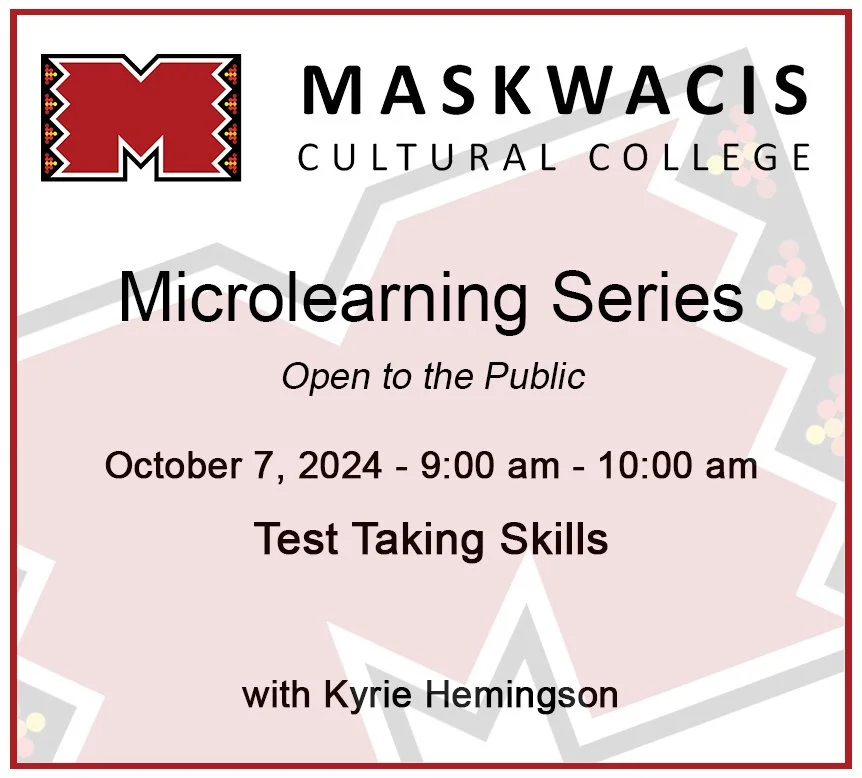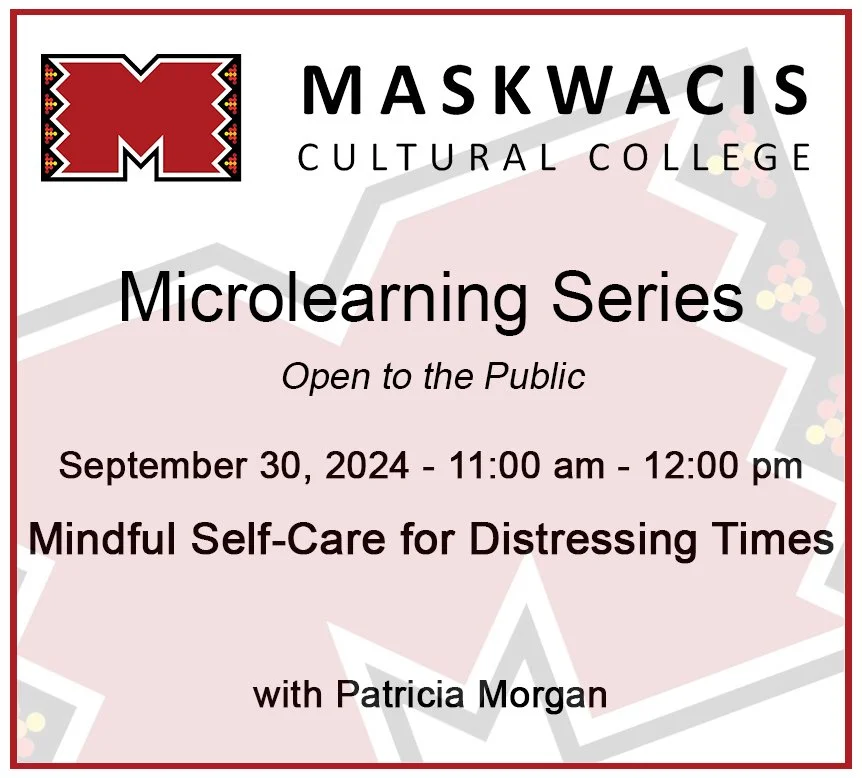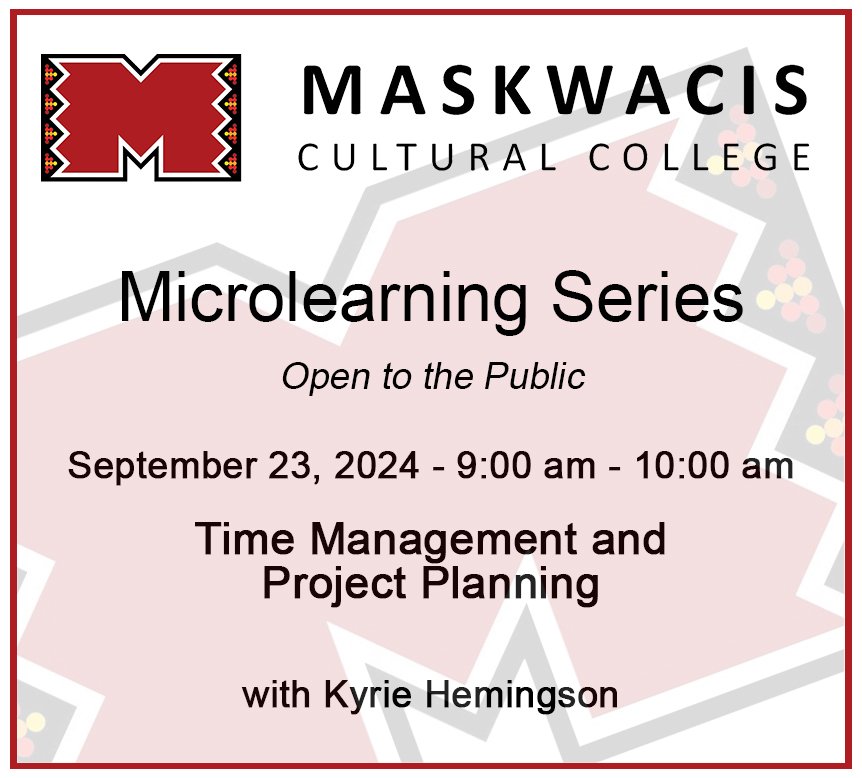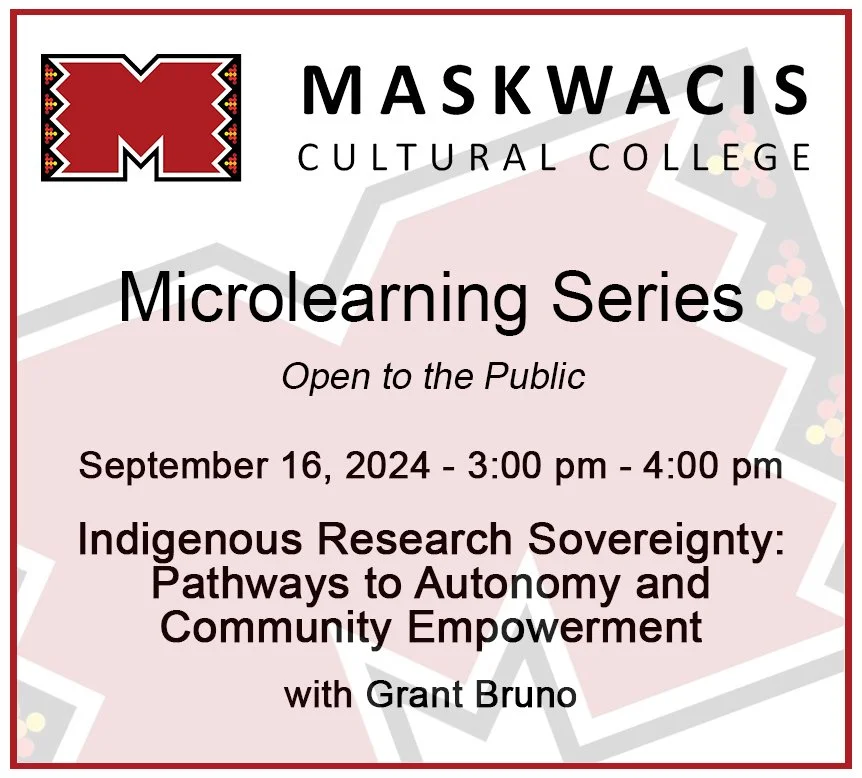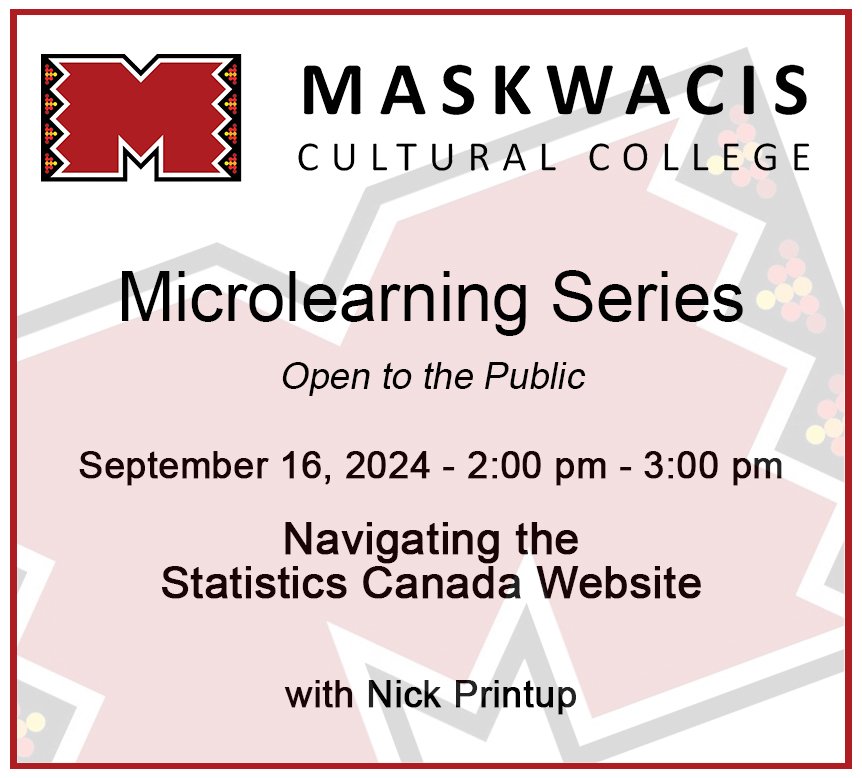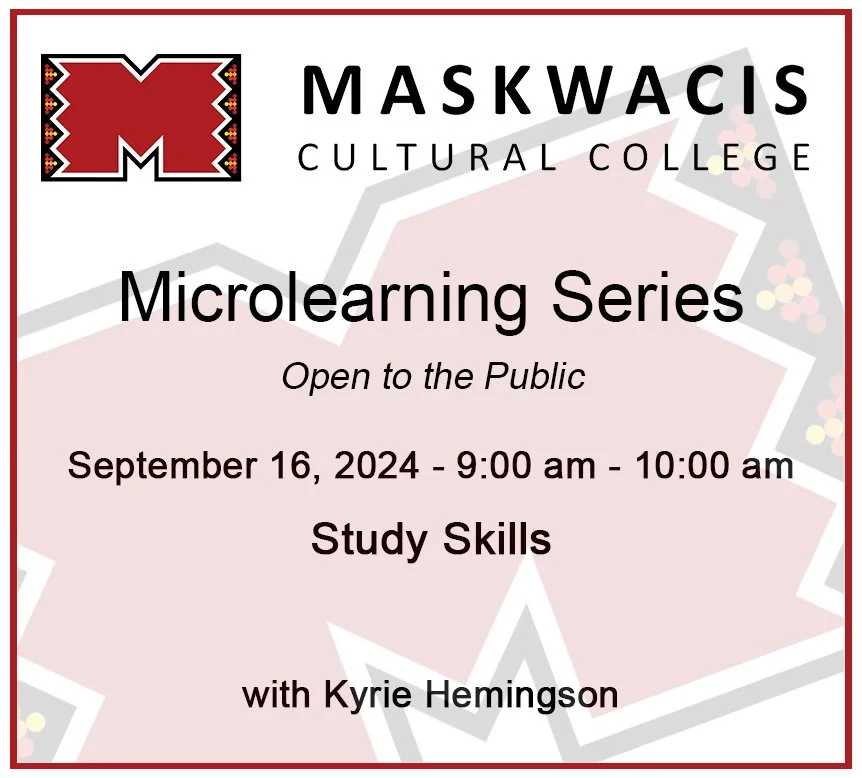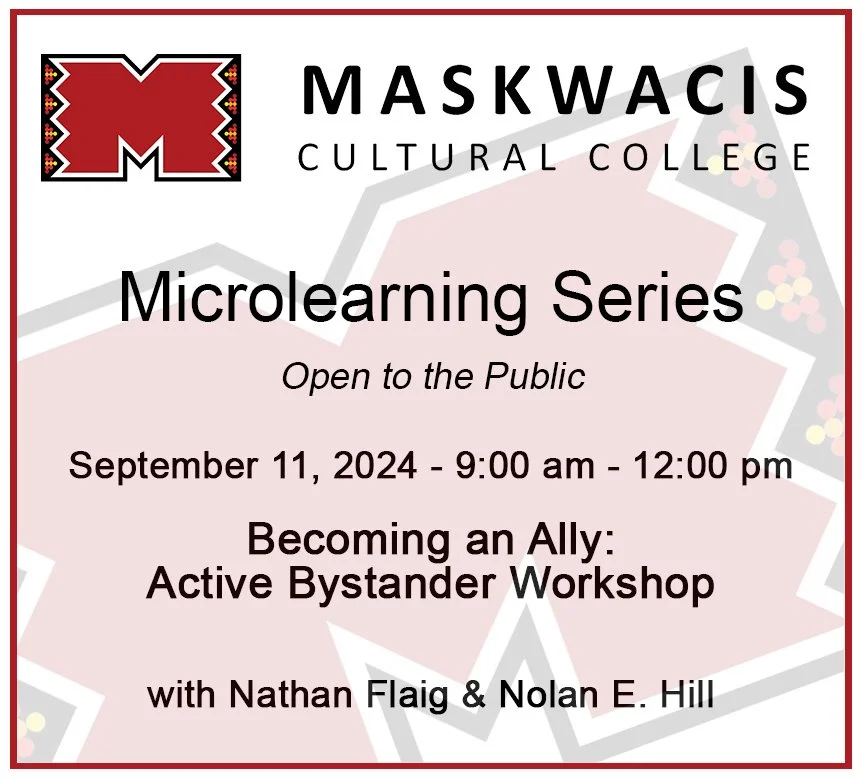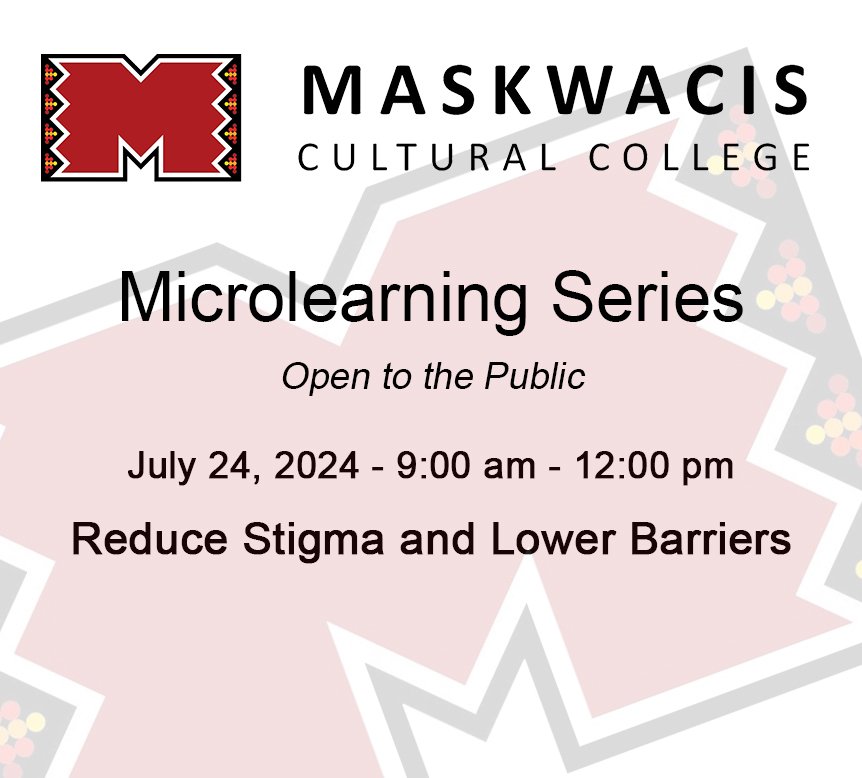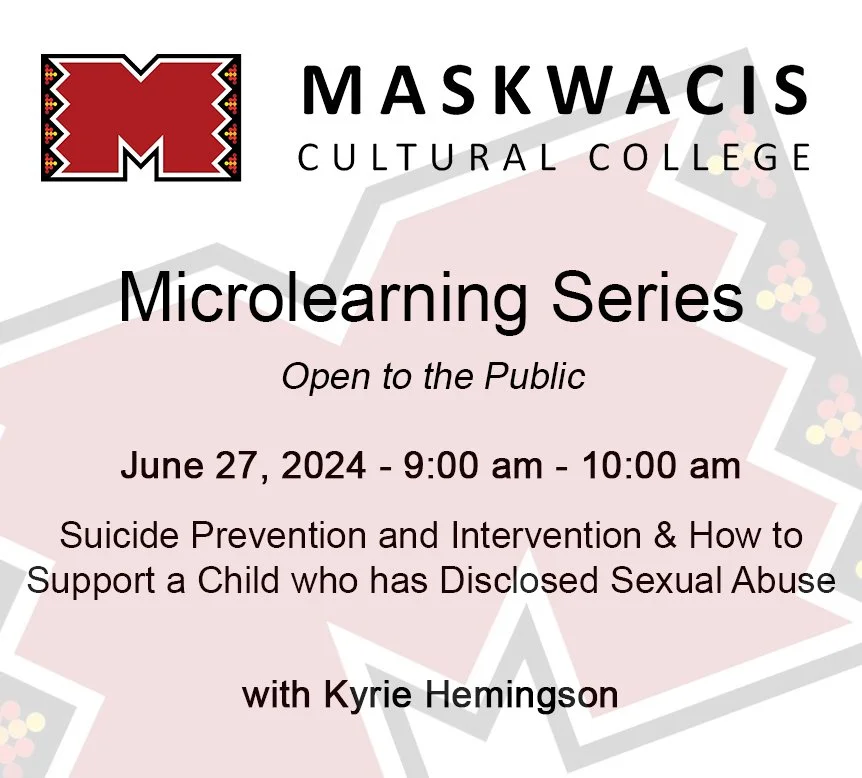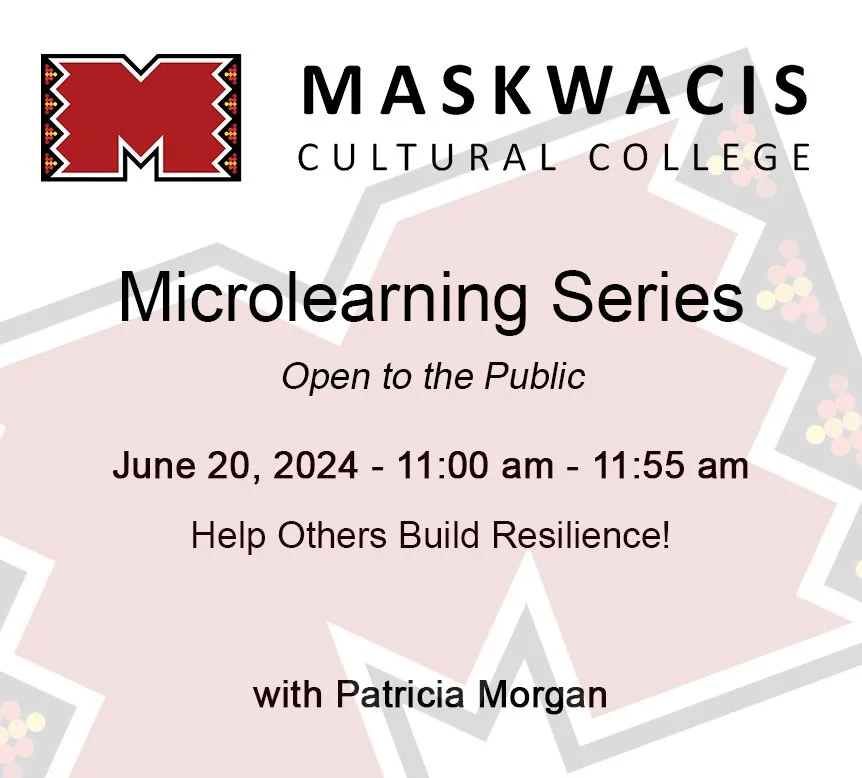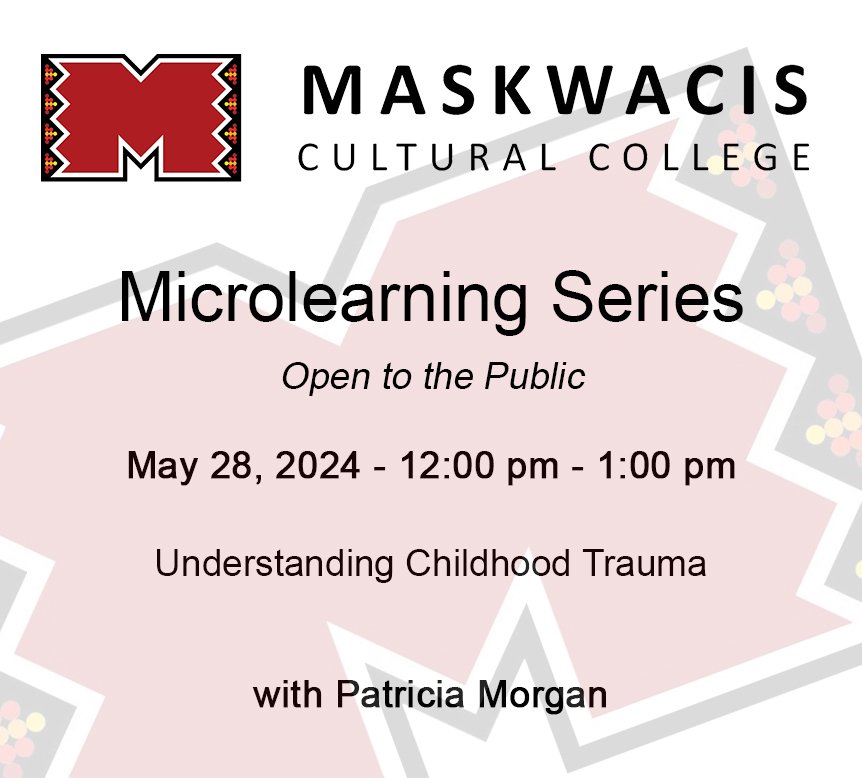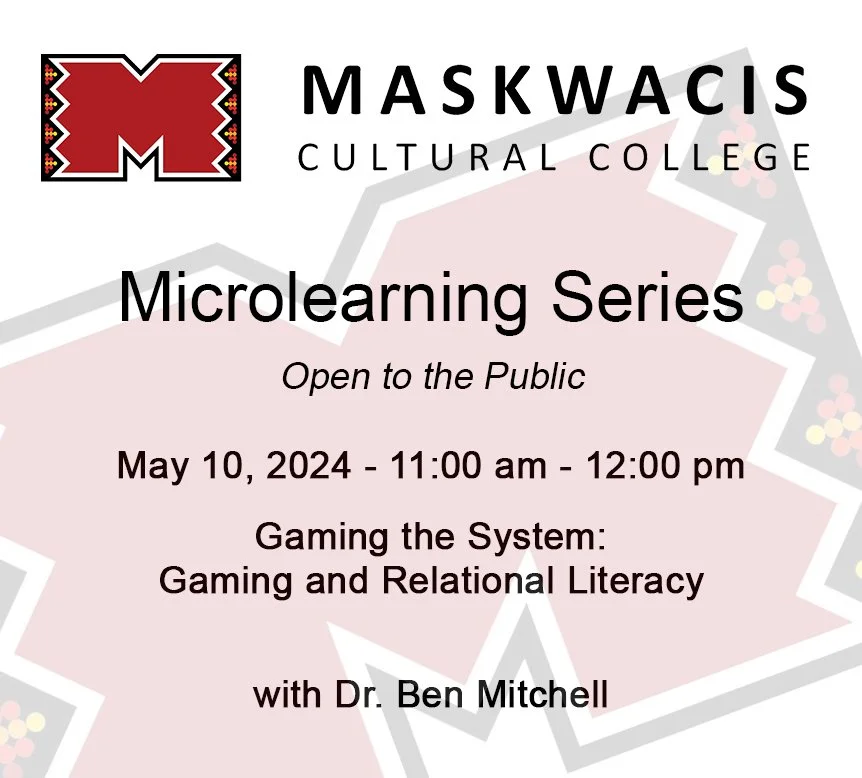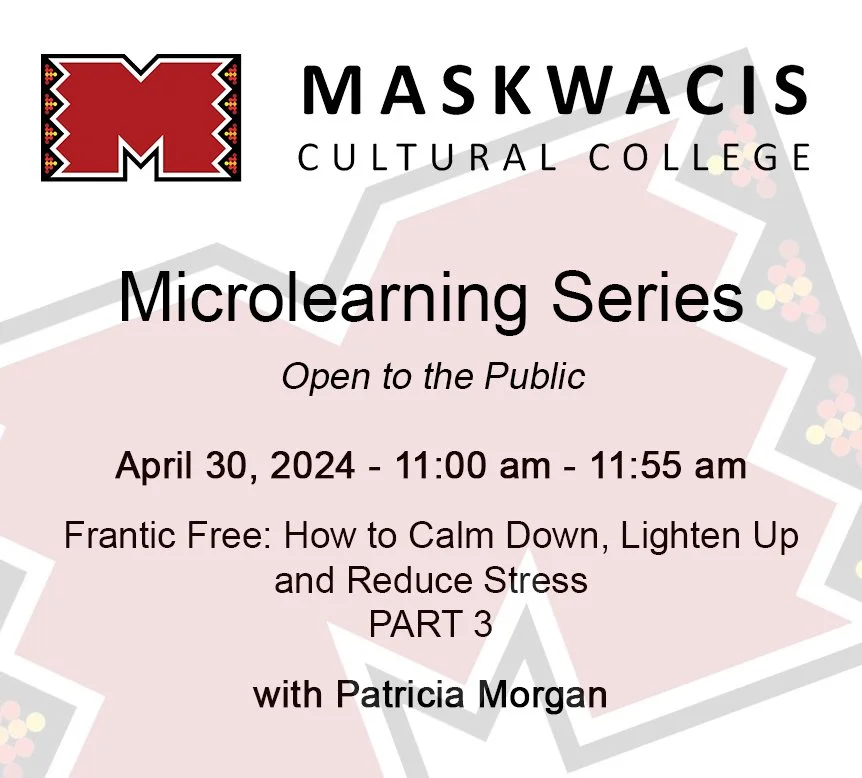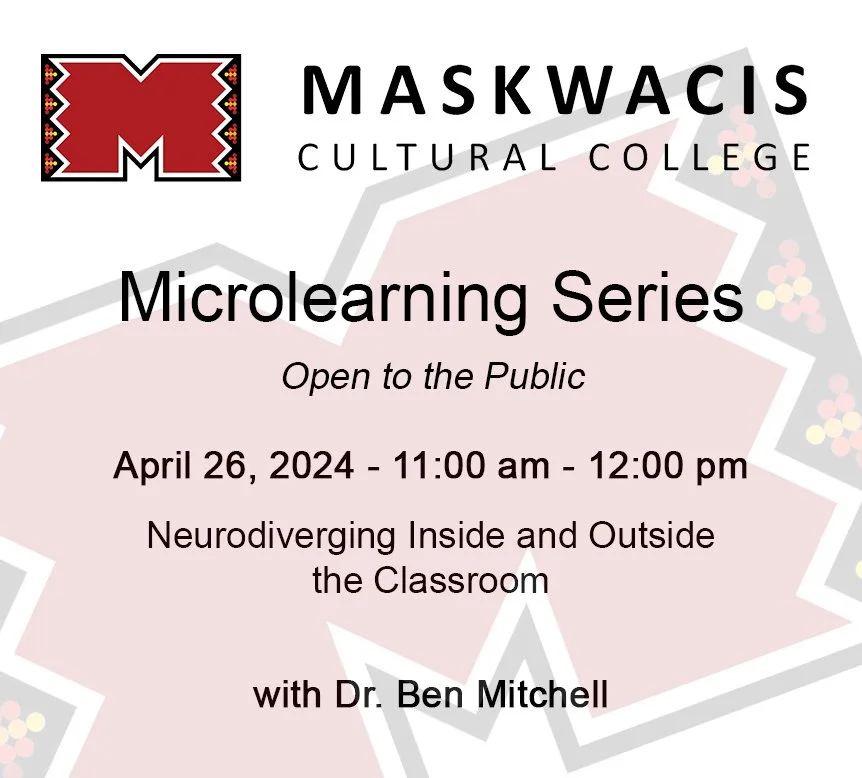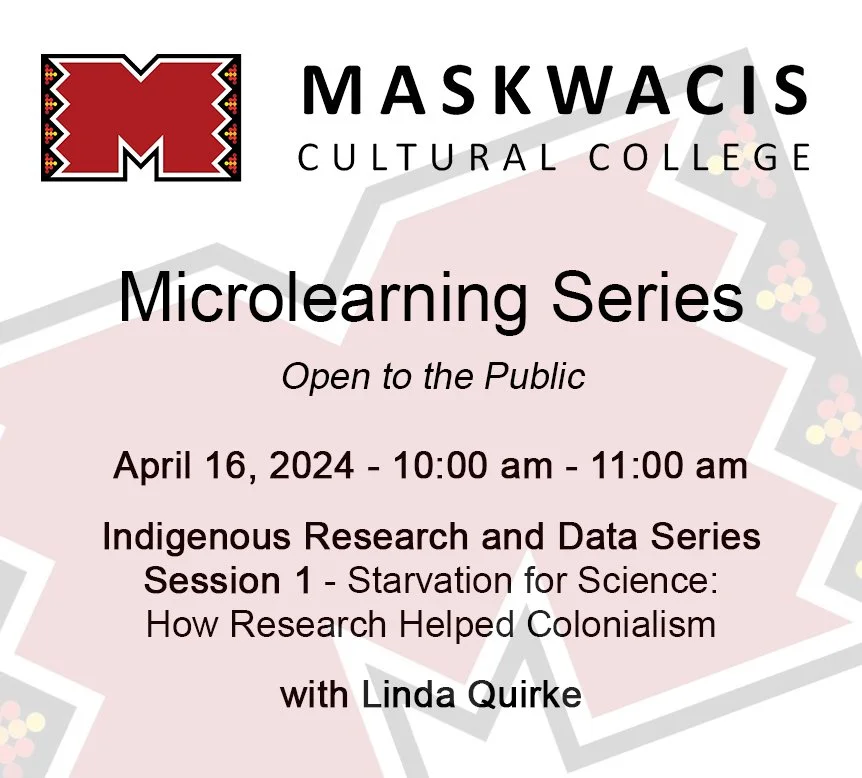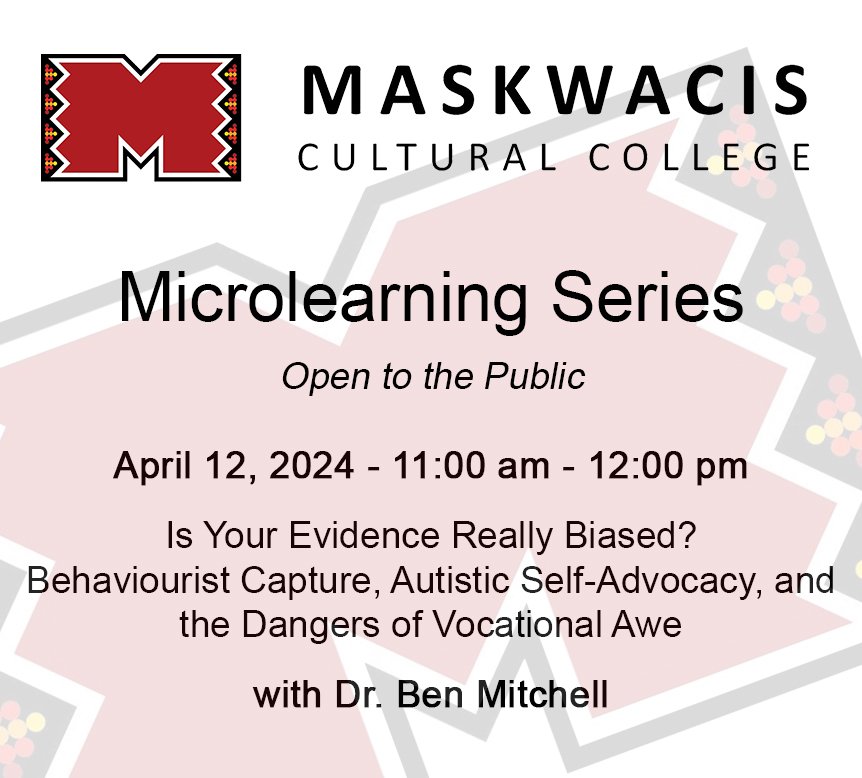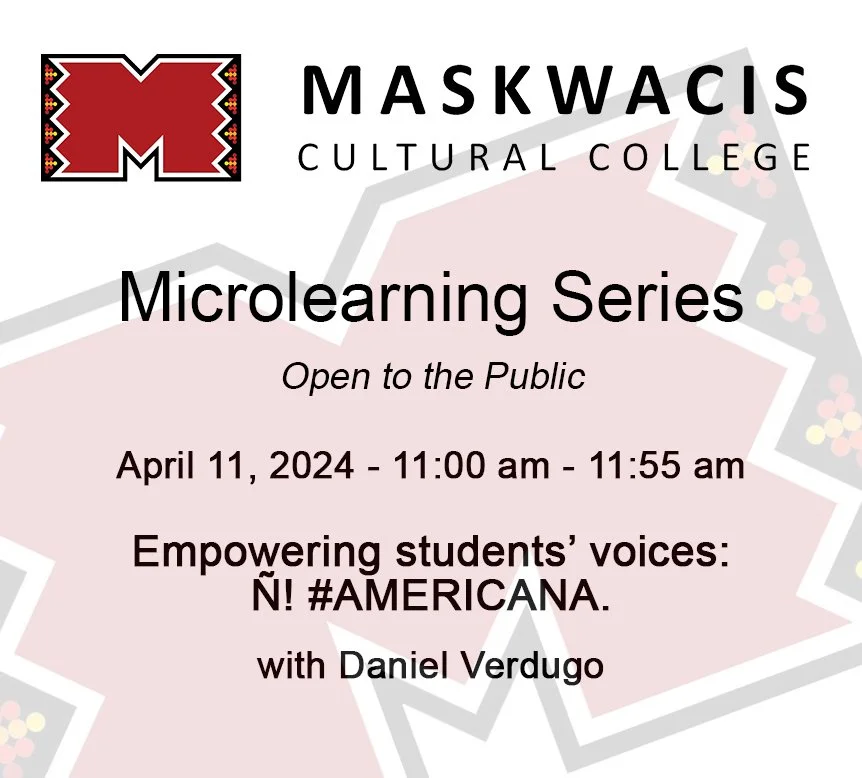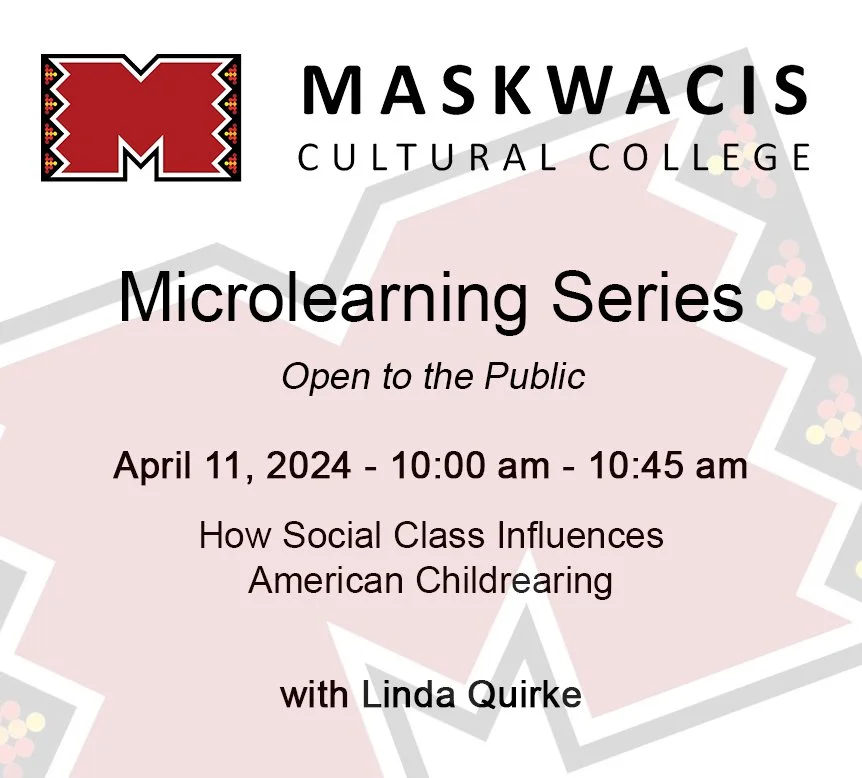

MCC Microlearning Series - Test Taking Skills
Test Taking Skills
This session is intended for college and university students as well as anyone interested in the basics of learning the most effective ways to take exams, including test-taking techniques and stress management. Covers how to approach different types of questions and maximize performance under timed conditions.
Presenter:
Kyrie Hemingson with McKinney Psychology
Cost: Free
Registration Link: https://forms.gle/NN7PDq7PY1qWpZRA9
This is part of the Maskwacis Cultural College Microlearning Series and is open to the public.
Contact Manisha Khetarpal by email mkhetarpal@mccedu.ca or call toll free: 1 866 585 3925
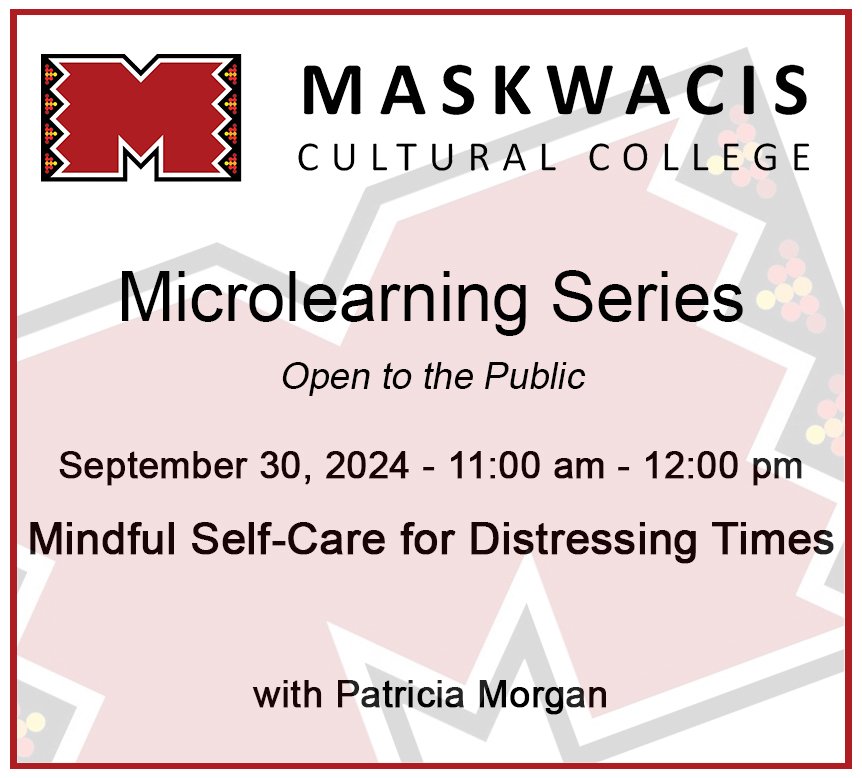
MCC Microlearning Series - Mindful Self-Care for Distressing Times
Mindful Self-Care for Distressing Times
Join us to explore and develop tools and resources to assist in maintaining or regaining solid mental health. Be reminded of, or discover, how your mind and body work in unison.
You will:
Understand stress and its impact.
Be reminded that you are capable, lovable, resilient.
Explore optional strategies for calming the mind and body.
Rediscover the power of noticing your body’s truth.
. . . and more
Presenter:
With a master’s degree in clinical psychology, Patricia Morgan works with organizations and individuals that want to strengthen their everyday resilience. Audiences describe Patricia’s message as meaningfully fun, surprisingly insightful and delightfully uplifting.
Her books include the counselling award winning, Return to Center: Simple Strategies to Navigate Distress, Depression, and Disconnection, the women’s resiliency guide, From Woe to WOW: How Resilient Women Succeed at Work and the Canadian best seller, Frantic Free: 167 Ways to Lighten Up and Calm Down.
Patricia was named a Woman of Vision by Global TV and is a recipient of the Spirit of CAPS (Canadian Association of Professional Speakers) for her contribution to the Canadian speaking industry.
Patricia continues to be a people booster in her role as a counselling therapist, author, speaker, and mentor. Check her out and see her in action at www.SolutionsForResilience.com Contact her at patricia@SolutionsForResilience.com or 403-830-6919.
Cost: Free
Registration Link: https://forms.gle/eJhAhEYZ5PXKyawq6
This is part of the Maskwacis Cultural College Microlearning Series and is open to the public.
Contact Manisha Khetarpal by email mkhetarpal@mccedu.ca or call toll free: 1 866 585 3925
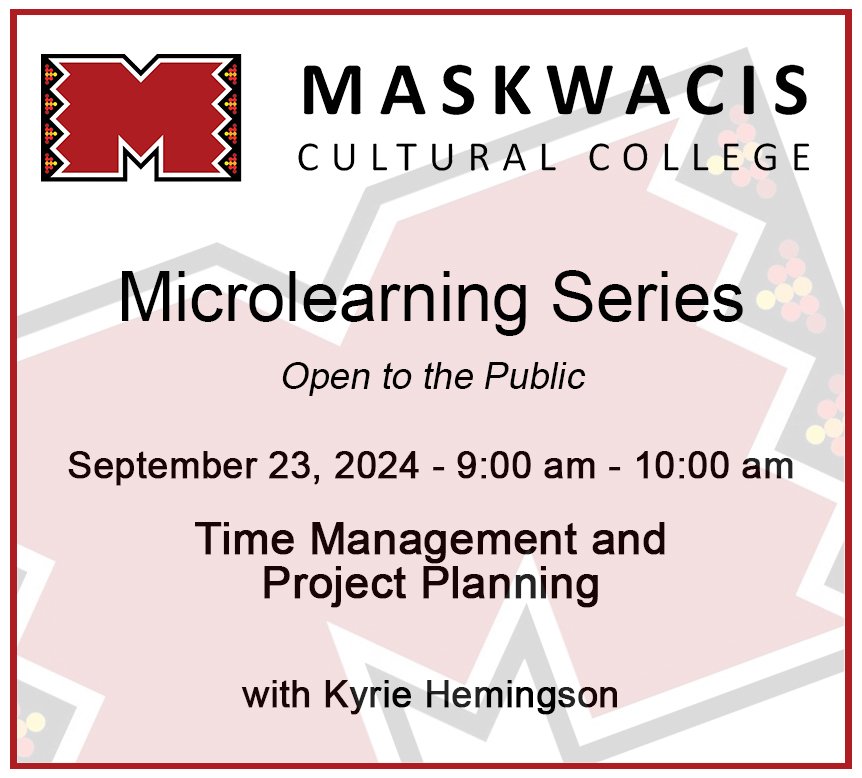
MCC Microlearning Series - Time Management and Project Planning
Time Management and Project Planning
This session is intended for college and university students as well as anyone interested in the basics of learning methods for organizing and prioritizing tasks to meet deadlines and achieve goals. Emphasizes scheduling, setting milestones, and balancing multiple responsibilities to improve productivity and efficiency.
Presenter:
Kyrie Hemingson with McKinney Psychology
Cost: Free
Registration Link: https://forms.gle/NN7PDq7PY1qWpZRA9
This is part of the Maskwacis Cultural College Microlearning Series and is open to the public.
Contact Manisha Khetarpal by email mkhetarpal@mccedu.ca or call toll free: 1 866 585 3925

MCC Microlearning Series - Indigenous Research Sovereignty: Pathways to Autonomy and Community Empowerment
Indigenous Research Sovereignty:
Pathways to Autonomy and Community Empowerment
This session will explore the concept of Indigenous research sovereignty and its critical role in promoting autonomy, self-determination, and community empowerment. Research sovereignty refers to the ability of Indigenous communities to lead, control, and guide research projects that impact their people, cultures, and lands. By reclaiming research processes from historically colonial institutions, Indigenous scholars and knowledge keepers are redefining academic methodologies and producing outcomes that align with their cultural values, priorities, and lived experiences.
Presenter:
Grant Bruno is nêhiyaw (Plains Cree) and a registered member of Nipsihkopahk (Samson Cree Nation), one of the reserves that makes up Maskwacis, Alberta. He is an Assistant Professor in the Department of Pediatrics at the University of Alberta. His research explores community-led research, supporting families in communities, and decolonizing methodologies rooted in nêhiyaw ways of knowing and being.
Cost: Free
Registration Link: https://forms.gle/ppxPq5CtAyYin7t48
This is part of the Maskwacis Cultural College Microlearning Series and is open to the public.
Contact Manisha Khetarpal by email mkhetarpal@mccedu.ca or call toll free: 1 866 585 3925

MCC Microlearning Series - Navigating the Statistics Canada Website
Navigating the Statistics Canada Website
This course is an introduction to the Statistics Canada website. The course will guide participants through the main sections of the website, focusing on how to access Indigenous statistics as well as how to find key indicators, community-level data, and census data products.
Presenter:
Nick Printup is an Indigenous Liaison Advisor (ILA) that has been employed with Statistics Canada for 3 years. Prior to recently becoming an ILA Nick was a Data Production and Dissemination Officer where his work had heavily been involved with training and developing content via the Indigenous Statistical Capacity Development Initiative. Nick is Onondaga beaver clan from Ohsweken (Six Nations of the Grand River), he is also Algonquin and a registered member of the Kitigan Zibi Anishinabeg First Nation. He holds an Honours Degree from Brock University in Media and Communications, an Advance Diploma in Broadcasting from Niagara College as well as a post-graduate certificate in International Business Management. Previously, Nick was employed at Indigenous Friendships Centre’s in Ottawa and the Niagara region working with at-risk Indigenous youth.
Cost: Free
Registration Link: https://forms.gle/JPDKeXfmQ3iMmtMh8
This is part of the Maskwacis Cultural College Microlearning Series and is open to the public.
Contact Manisha Khetarpal by email mkhetarpal@mccedu.ca or call toll free: 1 866 585 3925

MCC Microlearning Series - Study Skills
Study Skills
This session is intended for college and university students as well as anyone interested in the basics of learning techniques for effective learning, including note-taking, active reading, summarization, and self-testing. Focuses on methods to enhance comprehension, retention, and application of knowledge
Presenter:
Kyrie Hemingson with McKinney Psychology
Cost: Free
Registration Link: https://forms.gle/NN7PDq7PY1qWpZRA9
This is part of the Maskwacis Cultural College Microlearning Series and is open to the public.
Contact Manisha Khetarpal by email mkhetarpal@mccedu.ca or call toll free: 1 866 585 3925

MCC Microlearning Series - Becoming an Ally: Active Bystander Workshop
Becoming an Ally: Active Bystander Workshop
Through interactive activities and discussions, this workshop explores the roots of harassment experienced by those with intersectional identities, particularly the 2SLGBTQ+ community, and provides strategies to address discrimination, prevent harassment, and highlight the role of bystanders.
This workshop provides an overview of power and privilege, interactive opportunities to reflect on attitudes and beliefs around gender and sexual diversity and practical tools for being an engaged bystander. Participants will leave this training prepared to address harassment and discrimination in a way that empowers the person experiencing harm, while calling people who perpetuate harm into productive discussions.
Presenter:
Nathan Flaig (he/him) is the Team Lead of the Training Centre at the Centre for Sexuality. With a Master of Arts in Gender, Sexuality, and Women’s Studies from Simon Fraser University, Nathan has several years of research experience in the areas of gender and sexuality, as well as adult education. Prior to his work with the Training Centre, Nathan facilitated the WiseGuyz program at the Centre for Sexuality, delivering non-judgmental, comprehensive healthy relationship and sexual health programming to masculine-identified youth. He is passionate about providing meaningful and non-judgmental training to various audiences on the topics of sexuality, gender and sexual diversity, promoting a culture of anti-violence, and active allyship.
Nolan E. Hill is a Training Centre Facilitator at the Centre for Sexuality in Calgary. In this role, he facilitates professional development workshops for a variety of professionals around topics related to sexual health and sexuality. He brings background in queer health, HIV, and 2SLGBTQ+ community development to his role. He is passionate about health justice and ensuring queer and trans voices are amplified in the health system. He holds a Bachelor of Arts in Women’s Studies from the University of Calgary.
Cost: Free
Registration Link: https://forms.gle/ZbGqsrkkzPgMXzDb6
This is part of the Maskwacis Cultural College Microlearning Series and is open to the public.
Contact Manisha Khetarpal by email mkhetarpal@mccedu.ca or call toll free: 1 866 585 3925

MCC Microlearning Series - Becoming an Ally: Active Bystander Workshop
Becoming an Ally: Active Bystander Workshop
Through interactive activities and discussions, this workshop explores the roots of harassment experienced by those with intersectional identities, particularly the 2SLGBTQ+ community, and provides strategies to address discrimination, prevent harassment, and highlight the role of bystanders.
This workshop provides an overview of power and privilege, interactive opportunities to reflect on attitudes and beliefs around gender and sexual diversity and practical tools for being an engaged bystander. Participants will leave this training prepared to address harassment and discrimination in a way that empowers the person experiencing harm, while calling people who perpetuate harm into productive discussions.
Facilitators:
Nathan Flaig (he/him) is the Team Lead of the Training Centre at the Centre for Sexuality. With a Master of Arts in Gender, Sexuality, and Women’s Studies from Simon Fraser University, Nathan has several years of research experience in the areas of gender and sexuality, as well as adult education. Prior to his work with the Training Centre, Nathan facilitated the WiseGuyz program at the Centre for Sexuality, delivering non-judgmental, comprehensive healthy relationship and sexual health programming to masculine-identified youth. He is passionate about providing meaningful and non-judgmental training to various audiences on the topics of sexuality, gender and sexual diversity, promoting a culture of anti-violence, and active allyship.
Nolan E. Hill is a Training Centre Facilitator at the Centre for Sexuality in Calgary. In this role, he facilitates professional development workshops for a variety of professionals around topics related to sexual health and sexuality. He brings background in queer health, HIV, and 2SLGBTQ+ community development to his role. He is passionate about health justice and ensuring queer and trans voices are amplified in the health system. He holds a Bachelor of Arts in Women’s Studies from the University of Calgary.
Cost: Free
Registration Link: https://forms.gle/ZbGqsrkkzPgMXzDb6
This is part of the Maskwacis Cultural College Microlearning Series and is open to the public.
Contact Manisha Khetarpal by email mkhetarpal@mccedu.ca or call toll free: 1 866 585 3925
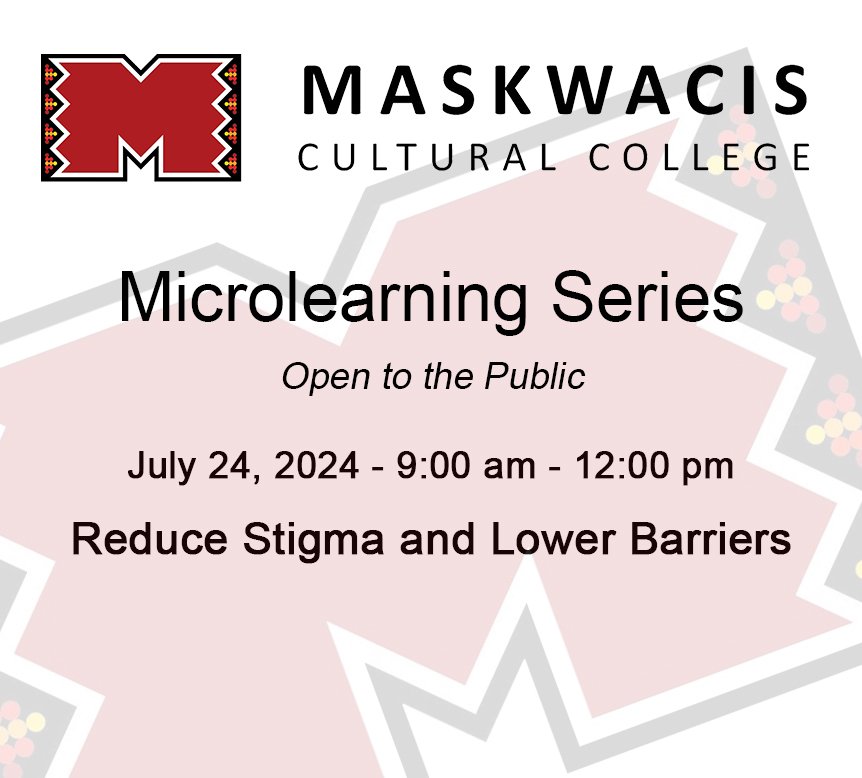
MCC Microlearning Series - Reduce Stigma and Lower Barriers
Reduce Stigma and Lower Barriers
This training explores how trauma and stigma can impact clients’ health and well-being, as well as access to health and social services. Through discussion and interactive activities, participants will learn practical strategies for reducing stigma in their own practice through trauma- and violence-informed care (TVIC). Participants will be introduced to the principles of TVIC and learn to challenge the access barriers that stigma can create for clients and patients.
Participants will leave with practical tools and skills to develop safer spaces and practices that respond to both the trauma and structural violence that can impact clients and patients when accessing services.
This workshop is for:
Healthcare and social services students and professionals of any experience level.
Cost: Free
Registration Link: https://forms.gle/dqymiNkn3fAwayct7
This is part of the Maskwacis Cultural College Microlearning Series and is open to the public.
Contact Manisha Khetarpal by email mkhetarpal@mccedu.ca or call toll free: 1 866 585 3925

MCC Microlearning Series - Suicide Prevention and Intervention and How to Support a Child who has Disclosed Sexual Abuse
Suicide Prevention and Intervention and How to Support a Child who has Disclosed Sexual Abuse
Presentations for how to help someone experiencing suicidal ideation and what to do if a child has disclosed sexual abuse.
"Suicide Prevention and Intervention: How to ask if someone is having thoughts of suicide"
Join us for a presentation on suicide prevention and intervention techniques. In this session, we will discuss the importance of recognizing signs of suicidal thoughts and how to effectively engage with someone who may be at risk. Additionally, we will discuss practical strategies and steps for asking the crucial question: "Are you thinking about suicide?" Gain confidence in navigating this sensitive conversation and discover resources available for support and intervention.
"How to support a child who has disclosed sexual abuse"
In this presentation, we delve into the sensitive but crucial topic of supporting a child who has disclosed being sexually abused. Participants will gain a deep understanding of how to respond immediately and sensitively upon disclosure, ensuring the child's safety and emotional well-being. We will explore practical steps for navigating legal obligations, accessing necessary medical and mental health services, and fostering a supportive environment for the child's recovery. This session equips you with valuable insights and resources to effectively support young survivors and promote their healing journey.
Presenter:
Kyrie Hemingson is currently serving as an intake therapist and summer student at McKinney Psychology, where she conducts initial consultations with clients and provides administrative support. She has just completed her third year of her Bachelor's degree, majoring in Psychology at the University of Alberta. Kyrie's academic journey at the University of Alberta has equipped her with a strong foundation in psychological principles and research methodologies. As she moves into the final year of her degree, Kyrie is focused on deepening her expertise in psychology and exploring opportunities for future career development in the field.
Cost: Free
Registration Link: https://forms.gle/oTKANu1jEuaLUzXUA
This is part of the Maskwacis Cultural College Microlearning Series and is open to the public.
Contact Manisha Khetarpal by email mkhetarpal@mccedu.ca or call toll free: 1 866 585 3925
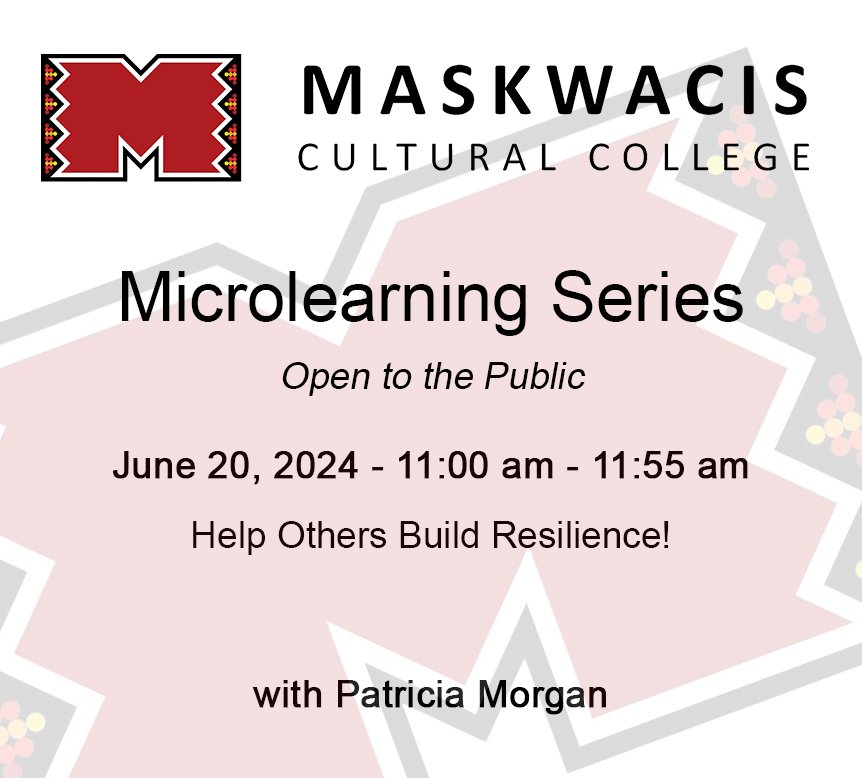
MCC Microlearning Series - Help Others Build Resilience!
Help Others Build Resilience!
How to be a People Booster!
You can build or at least influence others’ abilities to stay steady or bounce back from error, discouragement, or adversity. Imagine understanding basic resiliency concepts and having the tools to empower yourself while igniting the best in others. Discover the essentials of empowering others through positive role modeling, encouraging strengths, effective coaching and much more.
You will:
1. Have a framework for understanding the concept of personal resilience.
2. Become conscious of the influence you have on others by being a resilient role model.
3. Be given the 5 most powerful skills of effective resiliency coaching.
4. Leave with dozens of words and phrases that empower without rescuing.
5. Discover the dynamics of the Drama Triangle to avoid unhelpful language and positioning.
6. Gain the ability to identify and reinforce others’ strengths.
7. Know how to build and sustain the best in others.
Who will benefit? Managers, supervisors, coordinators, team leads, volunteer coordinators, coaches, Boy Scout/Girl Guide Leaders, youth workers, caregivers, foster parents, parents, support workers, and anyone who cares about others.
Presenter:
With a master’s degree in clinical psychology, Patricia Morgan works with organizations and individuals who want to strengthen their everyday resilience. Her ability to provide insight has helped many people emerge stronger after facing unthinkable challenge.
Patricia’s books include the award winning, Return to Center: Simple Strategies to Navigate Distress, Depression, and Disconnection, and the Canadian bestseller, Frantic Free: 167 Ways to Lighten Up and Calm Down. Patricia was named a Woman of Vision by Global TV and is a recipient of the Spirit of CAPS (Canadian Association of Professional Speakers) for her contribution to the Canadian speaking industry. Her counselling therapy services are covered by several Canadian Health Insurance programs.
Contact Patricia at patricia@SolutionsForResilience.com or 403.830.6919
“The difference she made to our people was they walked away strengthened, taking themselves a little more lightly; with additional knowledge and skills to make a positive impact in the lives of children, families and our communities.” Karen Pulla, YMCA Simcoe/Muskoka, Ontario
“We recommend Patricia to anyone who is looking at empowerment and being the best one can be. Her suggestions are realistic, provocative, and easy to implement. Our participants left with a smile, feeling positive and revitalized.” Dr. Anita Mitzner, Education Consultant, Alberta Health Services
Cost: Free
Registration Link: https://forms.gle/72sfpHcWdb5VnK6k7
This is part of the Maskwacis Cultural College Microlearning Series and is open to the public.
Contact Manisha Khetarpal by email mkhetarpal@mccedu.ca or call toll free: 1 866 585 3925
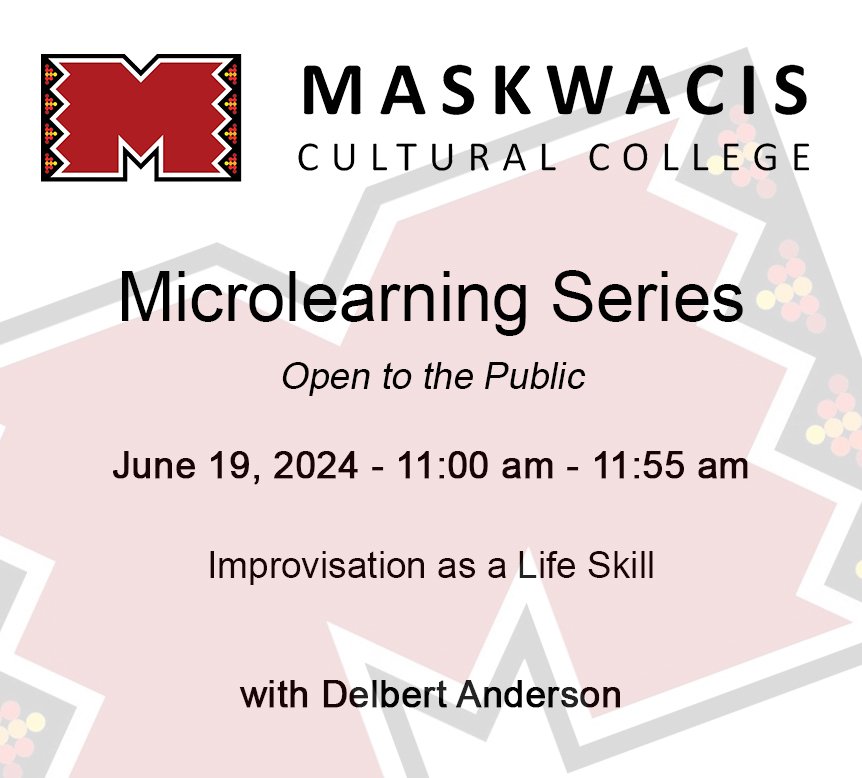
MCC Microlearning Series - Improvisation as a Life Skill
Improvisation as a Life Skill
30 minute presentation followed by 15 minute Q & A
Improvisation as a life skill looks into jazz history and traumatic events to define how improvisation was used to heal. Through a short improvisation activity, participants will understand how to utilize a similar process to their everyday lives. Participants will understand the idea of healing through improvisation and history.
Presenter:
Delbert Anderson, a Diné jazz trumpet artist, composer, and educator, stands at the forefront of a vibrant Native American jazz scene. His work, deeply rooted in his Diné heritage, seamlessly integrates Navajo "spinning songs" of love, healing, and courtship with jazz and funk, thus marking him as a community-minded Indigenous individualist. Through his Delbert Anderson Quartet, Anderson revives the improvised sounds of the Diné circle, blending them with jazz, funk, and hip-hop. His compositions are inspired by Navajo Nation landscapes, historical events, and the desire to preserve and educate about Diné history.
Anderson's notable projects include "The Long Walk: 1,674 Days," a poignant composition reflecting on a critical period in Navajo history, and "Manitou," which fuses ancient Native American melodies with jazz and funk. The Delbert Anderson Trio (DAT) showcases DAT jazz standards and original tunes, capturing the essence of his musical beginnings.
His commitment to community and education is evident through his "Build A Band" educational program, which teaches jazz improvisation to young students through a Diné and family curriculum, wellness programs, and community outreach initiatives aimed at evoking change for the well-being of all humans.
Anderson's achievements have garnered recognition, including multiple awards from Chamber Music America, the Cultural Capital Fellowship from the First Peoples Fund, and the Jazz Road Program at South Arts. His contributions to music and culture have been featured in prominent outlets like The New York Times, JazzTimes, Grammy.com, and NPR.
Cost: Free
Registration Link: https://forms.gle/kJxvKKaQtEYJ75y39
This is part of the Maskwacis Cultural College Microlearning Series and is open to the public.
Contact Manisha Khetarpal by email mkhetarpal@mccedu.ca or call toll free: 1 866 585 3925

MCC Microlearning Series - Creating a Culture of Respect for Gender and Sexual Diversity Workshop
Creating a Culture of Respect for Gender and Sexual Diversity Workshop
Centre for Sexuality (C4S) is implementing the “Community Driven Population and Public Health Project” with the financial support from the Government of Canada’s Sexual and Reproductive Health Fund (SRHF). Learn practical strategies for creating more inclusive work environments and safer spaces for gender and sexually diverse clients and co-workers.
This workshop is for: Professionals of any experience level in any sector.
Safer, more inclusive workplaces
This workshop discusses practical strategies for creating more inclusive environments for gender and sexually diverse (2SLGBTQ+) clients and co-workers at your workplace.
Through interactive activities and discussion, participants will explore the differences between sex, gender, and sexual orientation, while discussing the impacts of homophobia, biphobia, transphobia on 2SLGBTQ+ individuals.
Participants will leave this session with the skills and tools to support 2SLGBTQ+ clients and colleagues.
Cost: Free
Registration Link: https://forms.gle/enYn6YJaQjTRaKLC6
This is part of the Maskwacis Cultural College Microlearning Series and is open to the public.
Contact Manisha Khetarpal by email mkhetarpal@mccedu.ca or call toll free: 1 866 585 3925

MCC Microlearning Series - Understanding Childhood Trauma
Understanding Childhood Trauma
“You are not lazy, unmotivated, or stuck. After years of living your life in survival mode, you are exhausted. There is a difference.” Nakeia Homer, self-love author
If, in our childhood we did not get our physical and emotional needs met, we developed effective coping strategies for back then. Those patterns helped us survive!
However, in our adult years they may no longer service us. We may be inappropriately triggered into an emotionally dysregulated state, which then pulls us into angry outbursts, anxiety, defending, fleeing out the door, becoming silent or invisible, collapsing, or shutting down. Years of being dysregulated can lead to mental, emotional, relational, and physical health problems.
This session is for you if you suspect you have challenges rooted in unresolved childhood trauma or you are concerned about a loved one. Leave the session with:
1. An understanding of childhood trauma.
2. A sense of events, conditions, and situations than can infuse childhood trauma.
3. Signs that you are, or a loved one is, living with childhood trauma.
4. First steps to healing.
Presenter:
With a master’s degree in clinical psychology, Patricia Morgan works with organizations and individuals who want to strengthen their everyday resilience. Her ability to provide insight has helped many people emerge stronger after facing unthinkable challenge.
Patricia’s books include the award winning, Return to Center: Simple Strategies to Navigate Distress, Depression, and Disconnection, and the Canadian bestseller, Frantic Free: 167 Ways to Lighten Up and Calm Down. Patricia was named a Woman of Vision by Global TV and is a recipient of the Spirit of CAPS (Canadian Association of Professional Speakers) for her contribution to the Canadian speaking industry. Her counselling therapy services are covered by several Canadian Health Insurance programs.
Contact Patricia at patricia@SolutionsForResilience.com or 403.830.6919
Cost: Free
Registration Link: https://forms.gle/RGzfNKfGWPfxCdUUA
This is part of the Maskwacis Cultural College Microlearning Series and is open to the public.
Contact Manisha Khetarpal by email mkhetarpal@mccedu.ca or call toll free: 1 866 585 3925
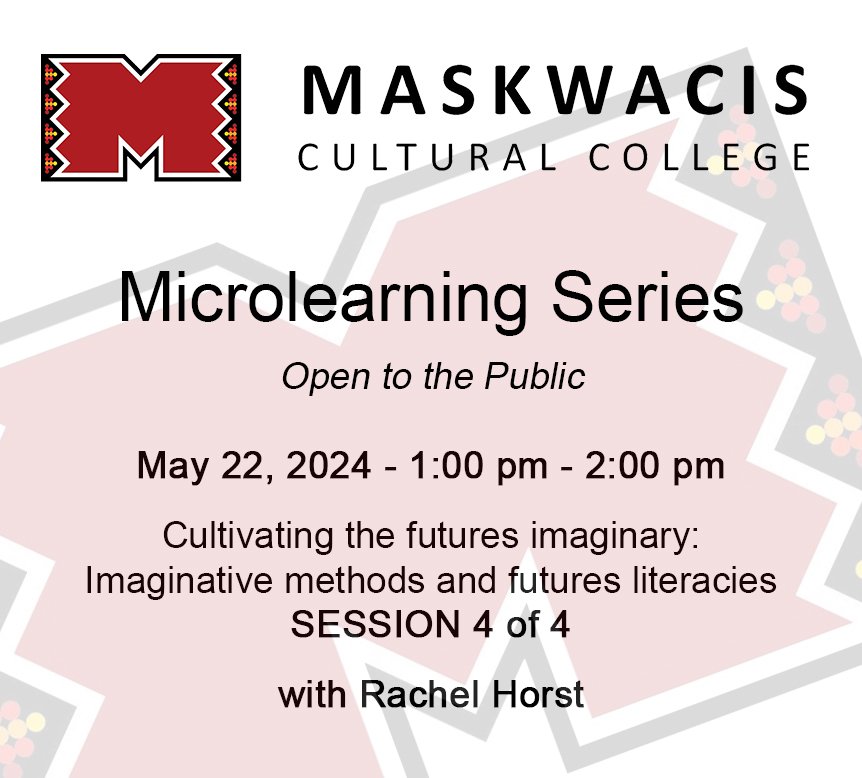
MCC Microlearning Series - Cultivating the Futures Imaginary: Imaginative Methods and Futures Literacies Session 4 of 4
Cultivating the Futures Imaginary:
Imaginative Methods and Futures Literacies
Session 4 of 4
A Future for Futures
In this final 30-minute participatory session we will share the results of our creative process, along with thoughts, feelings, questions, and - if participants wish - a performance of the fictopoeitic future worlds that were created in the previous session. We will return again to the concept of futures literacies and share thoughts about the experience and what was evoked through their practice of fictopoeisis. Finally, we will engage a new activity— the participatory design of a futures imagining prompt that might provoke different shades of future futures imagining. This activity is based upon her recent doctoral research and will be the first time Rachel has tried it out with a group. We will experiment together and see how it goes!
Presenter:
Rachel Horst is literacy scholar and educator who recently completed her doctoral degree from the Department of Language and Literacy Education at The University of British Columbia. Her research focusses upon creative and arts-based digital literacies and future literacies pedagogies as conceptualized through a posthuman ontology of difference. Her work investigates the generative confluence of digital creation, writing-as-becoming, and creative futures for cultivating the imaginary. Informed by decolonial discourse, Rachel’s research praxis takes up creative methods that seek to map theoretically enriched pathways between literacies scholarship, systems thinking, and future literacies pedagogy. Rachel currently lives with her family in xwilkway (Halfmoon Bay, British Columbia). Before pursuing her doctoral degree she was a secondary school teacher, working in the remote Indigenous community of Bella Bella, BC, and at the alternative school on the traditional territory of the Shishalh peoples on the Sunshine Coast, BC. Her teaching practice continues to be informed by her work with youth outside of mainstream contexts, exploring creative technologies for sharing alternative stories of selves and futures in and for troubled times.
Cost: Free
Registration Link: https://forms.gle/Gd9YLwckZypxaJdj8
This is part of the Maskwacis Cultural College Microlearning Series and is open to the public.
Contact Manisha Khetarpal by email mkhetarpal@mccedu.ca or call toll free: 1 866 585 3925
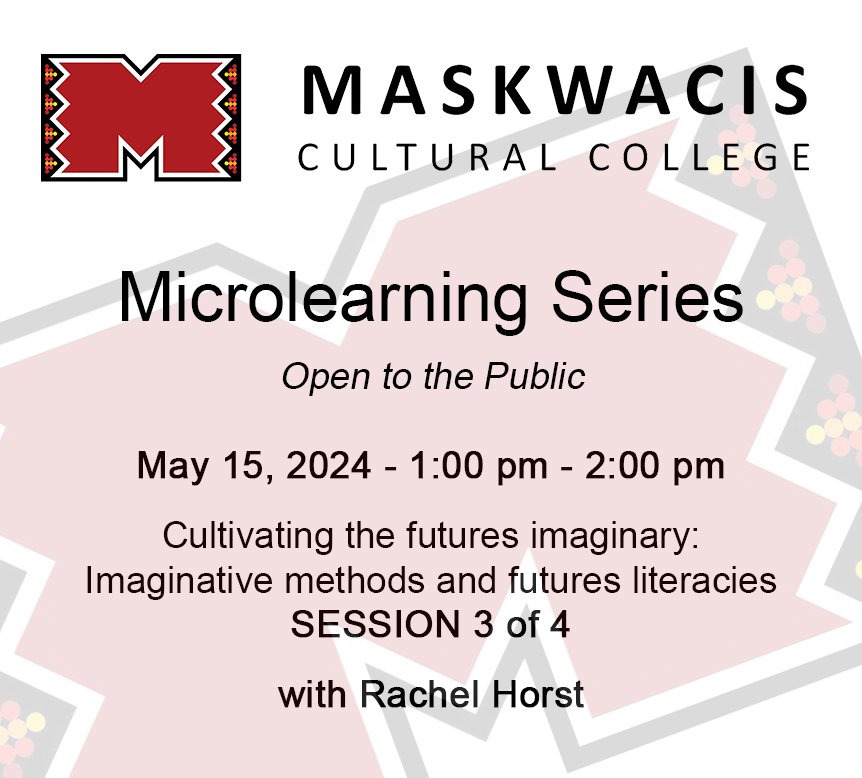
MCC Microlearning Series - Cultivating the Futures Imaginary: Imaginative Methods and Futures Literacies Session 3 of 4
Cultivating the Futures Imaginary:
Imaginative Methods and Futures Literacies
Session 3 of 4
Fictopoeisis and Creative Futures Writing
In this 30-minute creative writing and imagining session, we will engage in a practice of what Rachel theorizes in her doctoral studies as fictopoeisis – or the creation of fictions to inquire into future worlds. The focus of fictopoeisis is exploration, experimentation, curious inquiry, and play in and with imagined future spaces. Participants will be introduced to a series of creative digital writing and imagining prompts that help spark the emergence of fictional peoples, technologies, and materialities to explore through creative and expressive writing. Participants will have time to write in a group context and share the surprising landscapes of their imaginary future worlds.
Presenter:
Rachel Horst is literacy scholar and educator who recently completed her doctoral degree from the Department of Language and Literacy Education at The University of British Columbia. Her research focusses upon creative and arts-based digital literacies and future literacies pedagogies as conceptualized through a posthuman ontology of difference. Her work investigates the generative confluence of digital creation, writing-as-becoming, and creative futures for cultivating the imaginary. Informed by decolonial discourse, Rachel’s research praxis takes up creative methods that seek to map theoretically enriched pathways between literacies scholarship, systems thinking, and future literacies pedagogy. Rachel currently lives with her family in xwilkway (Halfmoon Bay, British Columbia). Before pursuing her doctoral degree she was a secondary school teacher, working in the remote Indigenous community of Bella Bella, BC, and at the alternative school on the traditional territory of the Shishalh peoples on the Sunshine Coast, BC. Her teaching practice continues to be informed by her work with youth outside of mainstream contexts, exploring creative technologies for sharing alternative stories of selves and futures in and for troubled times.
Cost: Free
Registration Link: https://forms.gle/Gd9YLwckZypxaJdj8
This is part of the Maskwacis Cultural College Microlearning Series and is open to the public.
Contact Manisha Khetarpal by email mkhetarpal@mccedu.ca or call toll free: 1 866 585 3925
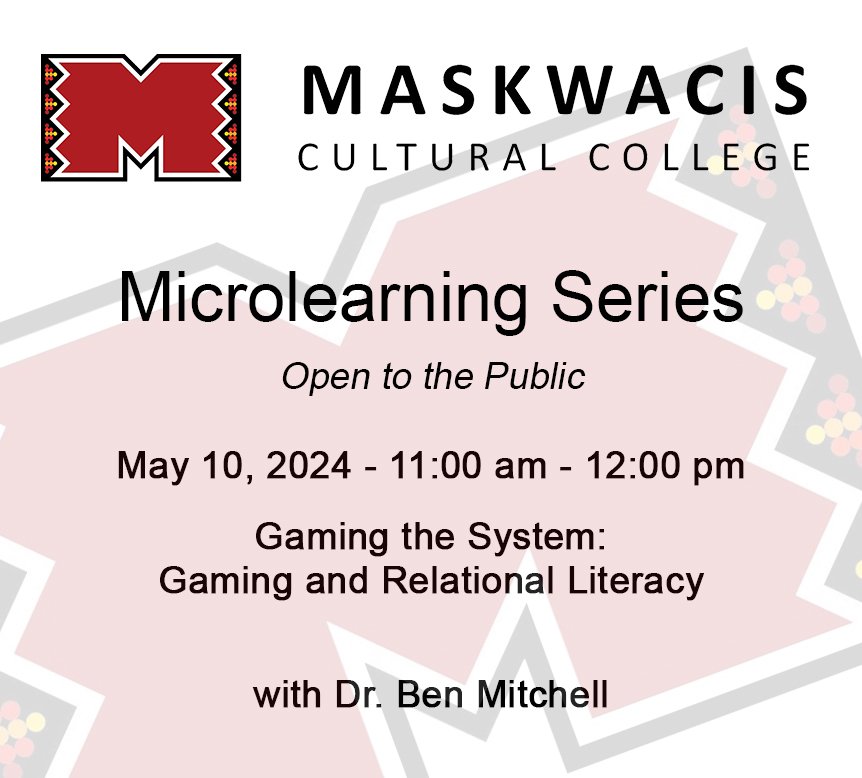
MCC Microlearning Series - Gaming the System: Gaming and Relational Literacy
Gaming the System: Gaming and Relational Literacy
Video gaming is a kind of literacy, and one that has a proven effect on other kinds of literacies, such as cultural, technological, and media literacy as well as design thinking. As educators, it is important to understand what literacies or “reading practices” students are already bringing into the classroom in order to teach from a place that recognizes students’ strengths and supports their interests. This is particularly the case for many neurodivergent learners, especially those who are autistic and/or ADHD, for whom gaming often provides a valuable and accessible sphere of agency, engagement, achievement, and self-expression.
At the same time, a simple “gamification” approach to education risks instrumentalizing away the very things that make gaming so appealing. This is sometimes described as the “chocolate covered broccoli” effect. Worse, a gaming-as-unidirectional-intervention approach, which has been particularly prevalent in the medical discourse of the past several years, risks uncritically reinscribing stigmatizing, over-simplified, and outright manipulative practices (the medical or educational equivalent of Gacha games).
Instead, an engagement with game-based literacies should be based on the core relationality at the centre of education itself, involving an open-endedness and meaningful interactivity that allows for the development of a student’s sense of agency, engagement, achievement, and self-expression.
Presenter:
Dr. Ben Mitchell is a librarian, educator, and researcher with a background in the history of science and medicine. They have been a curator involved in the public history of mental health and neurodivergence and have delivered talks and programming on topics related to neurodiversity and information literacy at numerous conferences and events, including as an invited speaker at the Waterloo Public Library and as part of CAPAL’s Diversity & Equity Committee. They are also the organizer of the Neuro-GLAM-erous Discord server and annual conference for neurodivergent gallery, library, archives, and museum (GLAM) workers.
Cost: Free
Registration Link: https://forms.gle/YfU184wQWQqbtNXe9
This is part of the Maskwacis Cultural College Microlearning Series and is open to the public.
Contact Manisha Khetarpal by email mkhetarpal@mccedu.ca or call toll free: 1 866 585 3925

MCC Microlearning Series - Cultivating the Futures Imaginary: Imaginative Methods and Futures Literacies Session 2 of 4
Cultivating the Futures Imaginary:
Imaginative Methods and Futures Literacies
Session 2 of 4
Technology and the Futures Imaginary
In this 40-minute session, we will engage with a series of new media and artistic digital texts that model technologically saturated future worlds, exploring together the dangers, possibilities, and affordances of other-than-human futures. The focus in this session will be to inquire into ongoing developments in colonized/ing digital technologies and articulate pathways for creative and critical resistance that might move us towards more beneficial relationalities in and with our machines. Participants will explore and discuss their own affective responses to technologized futures and will leave the session with creative methods for collaborating with digital technologies to tell different stories of possibility.
Presenter:
Rachel Horst is literacy scholar and educator who recently completed her doctoral degree from the Department of Language and Literacy Education at The University of British Columbia. Her research focusses upon creative and arts-based digital literacies and future literacies pedagogies as conceptualized through a posthuman ontology of difference. Her work investigates the generative confluence of digital creation, writing-as-becoming, and creative futures for cultivating the imaginary. Informed by decolonial discourse, Rachel’s research praxis takes up creative methods that seek to map theoretically enriched pathways between literacies scholarship, systems thinking, and future literacies pedagogy. Rachel currently lives with her family in xwilkway (Halfmoon Bay, British Columbia). Before pursuing her doctoral degree she was a secondary school teacher, working in the remote Indigenous community of Bella Bella, BC, and at the alternative school on the traditional territory of the Shishalh peoples on the Sunshine Coast, BC. Her teaching practice continues to be informed by her work with youth outside of mainstream contexts, exploring creative technologies for sharing alternative stories of selves and futures in and for troubled times.
Cost: Free
Registration Link: https://forms.gle/Gd9YLwckZypxaJdj8
This is part of the Maskwacis Cultural College Microlearning Series and is open to the public.
Contact Manisha Khetarpal by email mkhetarpal@mccedu.ca or call toll free: 1 866 585 3925

MCC Microlearning Series - Cultivating the Futures Imaginary: Imaginative Methods and Futures Literacies Session 1 of 4
Cultivating the Futures Imaginary:
Imaginative Methods and Futures Literacies
Session 1 of 4
Futures Literacies
In this 60-minute session, participants will be introduced to the interdisciplinary concept of futures literacies along with different philosophical approaches to thinking and modeling complex futures in and for troubled times. We will explore the ways that futures imaginaries continue to be colonized by contemporary narratives of impossibility, and explore pathways for critical resistant to status quo futures through imaginative practice. In this session, we will engage with a selection of Indigenous narratives that model futures in radically different ways. Via hands-on and participatory creative imagining prompts, participants will explore their own sensing of the future and how this kind of reflective practice can help increase resilience in the face of uncertainty. Participants will leave this session with a strong understanding of futures literacies as a concept along with methods for critique and analysis of contemporary narratives of the future.
Presenter:
Rachel Horst is literacy scholar and educator who recently completed her doctoral degree from the Department of Language and Literacy Education at The University of British Columbia. Her research focusses upon creative and arts-based digital literacies and future literacies pedagogies as conceptualized through a posthuman ontology of difference. Her work investigates the generative confluence of digital creation, writing-as-becoming, and creative futures for cultivating the imaginary. Informed by decolonial discourse, Rachel’s research praxis takes up creative methods that seek to map theoretically enriched pathways between literacies scholarship, systems thinking, and future literacies pedagogy. Rachel currently lives with her family in xwilkway (Halfmoon Bay, British Columbia). Before pursuing her doctoral degree she was a secondary school teacher, working in the remote Indigenous community of Bella Bella, BC, and at the alternative school on the traditional territory of the Shishalh peoples on the Sunshine Coast, BC. Her teaching practice continues to be informed by her work with youth outside of mainstream contexts, exploring creative technologies for sharing alternative stories of selves and futures in and for troubled times.
Cost: Free
Registration Link: https://forms.gle/Gd9YLwckZypxaJdj8
This is part of the Maskwacis Cultural College Microlearning Series and is open to the public.
Contact Manisha Khetarpal by email mkhetarpal@mccedu.ca or call toll free: 1 866 585 3925
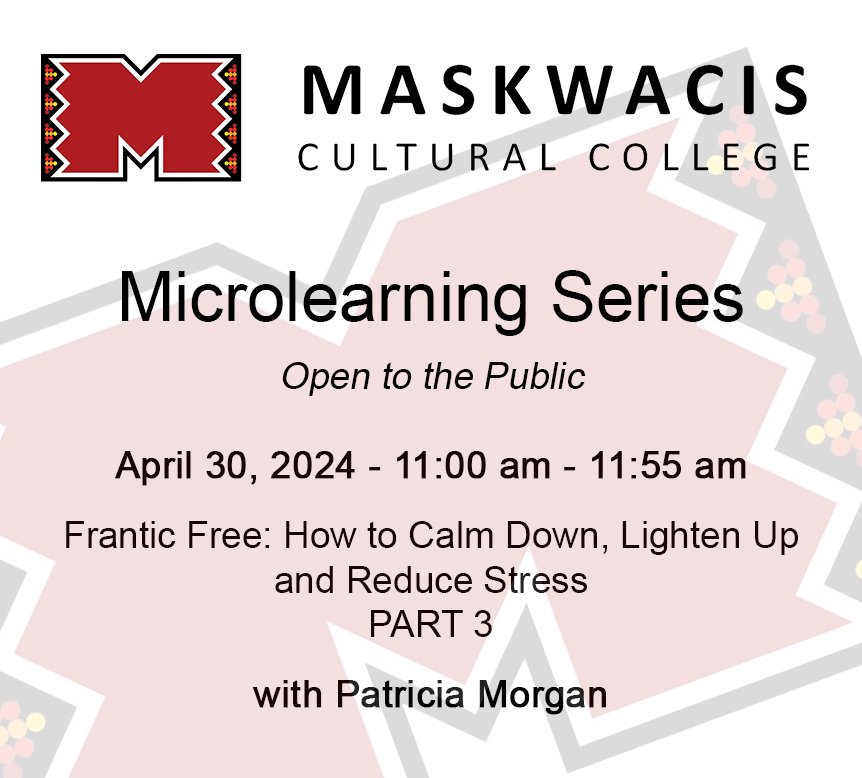
MCC Microlearning Series - Frantic Free: How to Calm Down, Lighten Up and Reduce Stress
Frantic Free: How to Calm Down, Lighten Up and Reduce Stress
3rd of 3 sessions
This upbeat and practical ‘how to’ session is based on Morgan’s Canadian Best selling micro-book, Frantic Free, 167 Ways to Calm Down and Lighten Up. You will discover how to minimize unnecessary stress, and how to better manage emotions, thought patterns and physical discomfort while increasing your fun factor.
You will:
1. Understand the difference between natural stress and unnecessary stress.
2. Learn how to limit and handle unnecessary stress.
3. Try out five relaxing 30 Second Quickies.
4. Transform distress into a smile.
Presenter:
Patricia Morgan is often referred to as the Spunky Seniorpreneur. Her ability to provide bite-sized knowledge nuggets for resilience has helped many people emerge stronger after facing unthinkable challenge.
Through Solutions for Resilience Patricia helps organizations and individuals strengthen resilience at work and at home. With a MA in Clinical Psychology, she has authored several books on resilience and stress management.
She is a recipient of Global TV’s Woman of Vision award and the Canadian Association of Professional Speakers’ Spirit of CAPS award for her contribution to the Canadian speaking industry. Patricia continues to be a people booster in her role as a therapist, author, TEDx speaker coach, and mentor. Check her out and see her in action at www.SolutionsForResilience.com
“Just being in the same room as Patricia Morgan is a stress reliever.”
Kay Olsen, Coordinator, Women in Business
Cost: Free
Registration Link: https://forms.gle/CzaGTKdPY9uRTgeZ6
This is part of the Maskwacis Cultural College Microlearning Series and is open to the public.
Contact Manisha Khetarpal by email mkhetarpal@mccedu.ca or call toll free: 1 866 585 3925

MCC Microlearning Series - Indigenous Research and Data Series Session 3 of 3 - How to Persuade Policymakers: Storytelling and Statistics
Indigenous Research and Data Series
Session #3 of 3 - How to Persuade Policymakers: Storytelling and Statistics
Building on our earlier two discussions, this talk will look at advice from Indigenous scholars regarding how best to collect and report data. We will talk about these experts’ advice, thinking about ways that Indigenous communities can benefit from research and data collection, with a larger goal of data sovereignty.
Watch: FNIGC: Data by First Nations for First Nations (7:19)
Watch: UAlberta's Cindy Blackstock (11:54)
Presenter:
Linda Quirke has been a faculty member in Sociology at Wilfrid Laurier University since 2008, after completing her PhD at McMaster University in 2006. Her SSHRC-funded research focuses on family life: parenting magazine advice and children's leisure time. She has previously examined parenting advice regarding children’s body weight and foodwork, as well as education and research ethics. She teaches courses in research methods and sociology of families. She lives on the Haldimand Tract (Kitchener) and her teenaged children roast her for being a so-called parenting “expert”.
Cost: Free
Registration Link: https://forms.gle/unpfBQphBiFGGCEb6
This is part of the Maskwacis Cultural College Microlearning Series and is open to the public.
Contact Manisha Khetarpal by email mkhetarpal@mccedu.ca or call toll free: 1 866 585 3925
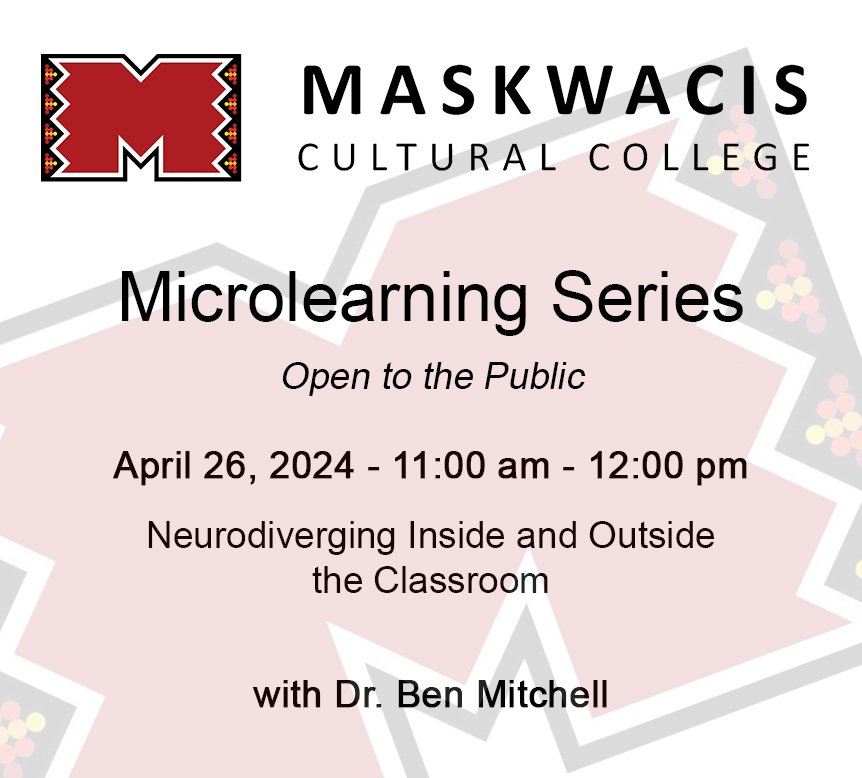
MCC Microlearning Series - Neurodiverging Inside and Outside the Classroom
Neurodiverging Inside and Outside the Classroom
This talk and discussion are about being neurodivergent in academia, including administrative and structural barriers to accessibility and institutional accountability in light of the high rates of abuse in academic settings and some ways to support neurodivergent students, faculty, and staff. We will explore the importance of representation for educational outcomes, the differences between intrinsic and extrinsic motivation, and discuss several approaches to teaching and outreach, such as by liaising effectively with student clubs, being honest to your own interest, and giving “interest informed” workshops.
Presenter:
Dr. Ben Mitchell is a librarian, educator, and researcher with a background in the history of science and medicine. They have been a curator involved in the public history of mental health and neurodivergence and have delivered talks and programming on topics related to neurodiversity and information literacy at numerous conferences and events, including as an invited speaker at the Waterloo Public Library and as part of CAPAL’s Diversity & Equity Committee. They are also the organizer of the Neuro-GLAM-erous Discord server and annual conference for neurodivergent gallery, library, archives, and museum (GLAM) workers.
Cost: Free
This is part of the Maskwacis Cultural College Microlearning Series and is open to the public.
Contact Manisha Khetarpal by email mkhetarpal@mccedu.ca or call toll free: 1 866 585 3925

MCC Microlearning Series - Indigenous Research and Data Series Session 2 of 3 - What Not To Do: Universities and First Nations Data
Indigenous Research and Data Series
Session #2 of 3 - What Not To Do: Universities and First Nations Data
This presentation will look closely at two examples of problematic research carried out on First Nations people. Our discussion will focus on two stories. First, we will learn about the Havasupai tribe, and a study they participated in at Arizona State University. Second, we will look at a more recent study and the Pictou Landing First Nation. Both examples show us the importance of “OCAP” principles regarding data: Ownership, Control, Access and Possession.
Watch: The Two Faces of Research: the Havasupai experience with Arizona State University (21:12)
Watch: The Havasupai Project (2:13)
Watch: Understanding the First Nations Principles of OCAP™: Our Road Map to Information Governance (2:36)
Presenter:
Linda Quirke has been a faculty member in Sociology at Wilfrid Laurier University since 2008, after completing her PhD at McMaster University in 2006. Her SSHRC-funded research focuses on family life: parenting magazine advice and children's leisure time. She has previously examined parenting advice regarding children’s body weight and foodwork, as well as education and research ethics. She teaches courses in research methods and sociology of families. She lives on the Haldimand Tract (Kitchener) and her teenaged children roast her for being a so-called parenting “expert”.
Cost: Free
Registration Link: https://forms.gle/unpfBQphBiFGGCEb6
This is part of the Maskwacis Cultural College Microlearning Series and is open to the public.
Contact Manisha Khetarpal by email mkhetarpal@mccedu.ca or call toll free: 1 866 585 3925

MCC Microlearning Series - How to Collaboratively Create Open Education Resources with your Students Session #2
How to Collaboratively Create Open Education Resources with your Students
Session #2
In this second session, we will continue to build on what you can do to create successful OERs with your students. We will look at ways of engaging students and selecting creative commons licensing options, how to manage data, and the importance of creating style guides for your project. I will share with you the challenges and successes I've had in creating my own OERs with my students.
Presenter:
Julia Alards-Tomalin is an instructor at the British Columbia Institute of Technology (BCIT), in Burnaby, Canada. She studied Forestry and Ecological Restoration at BCIT and recently completed a Master of Education at Simon Fraser University. Her background is diverse, including horticulture, arboriculture, invasive species management and ecological restoration, but is united by a common theme of plants.
Starting in 2019, Julia began to work with her students to create an Open Education textbook focusing on the winter identification of plants entitled Buds, Branches and Bark: A Guide to Winter ID in the Pacific Northwest. Buds, Branches and Bark is free to download, and the 3rd edition is currently available on the BCIT website. In 2022 Julia was awarded the Teaching Excellence in Open Education Employee Excellence Award at BCIT for her involvement in this Open Education Resource and several others. In 2023 the 2nd edition of Buds, Branches and Bark was awarded the Open Education Global Award for Excellence in the Open Pedagogy category and the BC campus Award for Excellence in Open Education.
Cost: Free
Registration Link: https://forms.gle/WLxaqFZFcEgWAuD49
This is part of the Maskwacis Cultural College Microlearning Series and is open to the public.
Contact Manisha Khetarpal by email mkhetarpal@mccedu.ca or call toll free: 1 866 585 3925

MCC Microlearning Series - Indigenous Research and Data Series Session 1 of 3 - Starvation for Science: How Research Helped Colonialism
Indigenous Research and Data Series
Session #1 of 3 - Starvation for Science: How Research Helped Colonialism
This discussion will review some of the history of scientific research and how it was used to support colonialism. We will look at malnourishment experiments conducted in the 1940s and 1950s. This talk will examine scientific research as a tool used by government officials to further colonization, rather than a neutral way of advancing knowledge.
Watch: 4:38-35:43: “Nutrition Experiments in Residential Schools”
Watch: Hunger experienced in residential schools linked to present-day health problems (2:11)
Presenter:
Linda Quirke has been a faculty member in Sociology at Wilfrid Laurier University since 2008, after completing her PhD at McMaster University in 2006. Her SSHRC-funded research focuses on family life: parenting magazine advice and children's leisure time. She has previously examined parenting advice regarding children’s body weight and foodwork, as well as education and research ethics. She teaches courses in research methods and sociology of families. She lives on the Haldimand Tract (Kitchener) and her teenaged children roast her for being a so-called parenting “expert”.
Cost: Free
Registration Link: https://forms.gle/unpfBQphBiFGGCEb6
This is part of the Maskwacis Cultural College Microlearning Series and is open to the public.
Contact Manisha Khetarpal by email mkhetarpal@mccedu.ca or call toll free: 1 866 585 3925
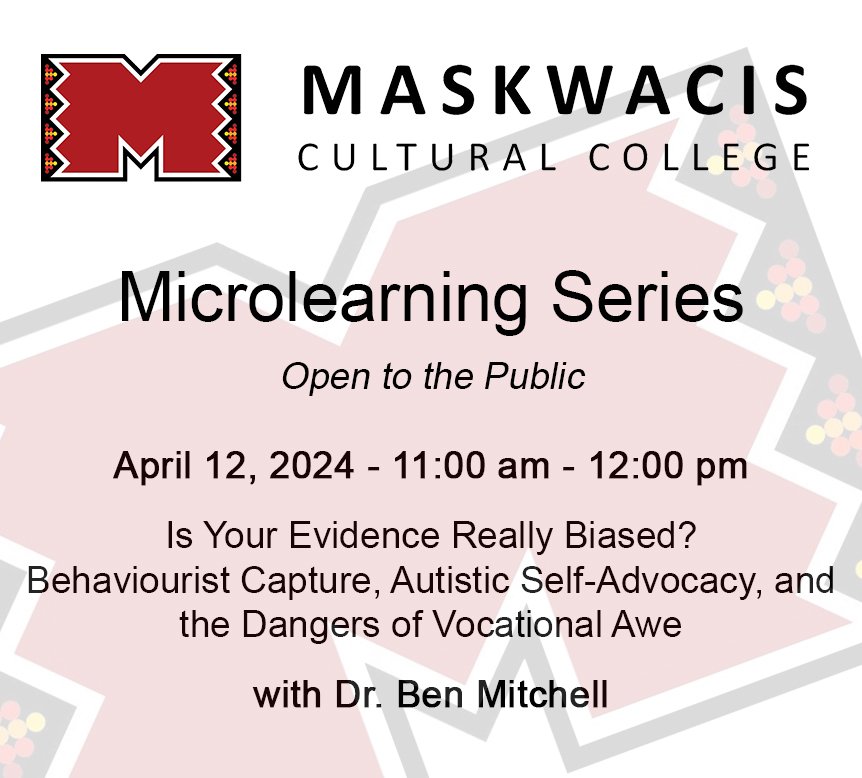
MCC Microlearning Series - Is Your Evidence Really Biased? Behaviourist Capture, Autistic Self-Advocacy, and the Dangers of Vocational Awe
Is Your Evidence Really Biased?
Behaviourist Capture, Autistic Self-Advocacy, and the Dangers of Vocational Awe
In the history of science and medicine there are numerous examples of how the “best available evidence” promoted by professional societies was profoundly, destructively wrong. This can be seen in the widespread support of scientific racism and eugenics as well as the pathologization of “sexual inversion” and gender variance. When academics talk about the nature of authority and hold up peer-review as an example of a methodological gold standard in academic and medical research, we must always ask ourselves: whose peers are we talking about? For that matter, whose interests are we talking about?
It is becoming increasingly evident even to those outside the autistic community that despite claims of being grounded in evidence-based practices, most studies on the effectiveness of Applied Behavioral Analysis (ABA) are poorly designed, do not disclose conflicts of interest, display a strategic disregard of the harmful outcomes of interventions, and do not reflect the interests of the majority of autistic people. At best, ABA is expensive, intensive, and ineffective at improving life outcomes. At worst, it is actively traumatic and makes us more susceptible to further victimization.
This discussion will examine recent challenges to the evidence-based nature of ABA and how ABA practitioners have historically taken advantage of the internalist nature of the peer-review system. These challenges reinforce what autistic activists have been saying for over twenty years and have consequences for how educators deliver information literacy instruction. Information literacy is not a neutral activity and must include a place for own voice narratives, patient, and survivor accounts if we are to avoid perpetuating harmful industry standards with a shrug and a gesture to how “well, everyone’s doing it.”
Presenter:
Dr. Ben Mitchell is a librarian, educator, and researcher with a background in the history of science and medicine. They have been a curator involved in the public history of mental health and neurodivergence and have delivered talks and programming on topics related to neurodiversity and information literacy at numerous conferences and events, including as an invited speaker at the Waterloo Public Library and as part of CAPAL’s Diversity & Equity Committee. They are also the organizer of the Neuro-GLAM-erous Discord server and annual conference for neurodivergent gallery, library, archives, and museum (GLAM) workers.
Cost: Free
Registration Link: https://forms.gle/eKEh8SS752BpABAX9
This is part of the Maskwacis Cultural College Microlearning Series and is open to the public.
Contact Manisha Khetarpal by email mkhetarpal@mccedu.ca or call toll free: 1 866 585 3925

MCC Microlearning Series - Empowering students’ voices: Ñ! #AMERICANA.
Empowering students’ voices: Ñ! #AMERICANA.
Classroom magazines can be effective media projects to engage students in learning. In this presentation, attendees will learn about Ñ! magazine and explore how publishing classroom projects can create opportunities to develop literacy, collaboration, cultural competency, and self-expression. Empower your students’ voices. Publish your class mag!
Presenter:
Daniel Verdugo is a Spanish teacher at Huron HS, in Ann Arbor Public Schools, Michigan. He was born and raised in Spain, and earned his bachelor’s degree at the University of Barcelona. He is currently pursuing his TESOL Master's Degree at Western Michigan University.
He is the founder of myclassmag.com and publisher of Ñ! magazine. His teaching practice focuses on providing opportunities for reflection and dialogue in the classroom as a way to develop language proficiency, digital literacy, and critical thinking. Ñ! magazine was recognized by the American Council on Teaching Foreign Languages with the 2023 ACTFL/LCF Award for Excellence in Diversity, Equity, and Inclusion in the Classroom.
Cost: Free
Registration Link: https://forms.gle/8UJ4rmfAB85U4r9c7
This is part of the Maskwacis Cultural College Microlearning Series and is open to the public.
Contact Manisha Khetarpal by email mkhetarpal@mccedu.ca or call toll free: 1 866 585 3925

MCC Microlearning Series - How Social Class Influences American Childrearing
How Social Class Influences American Childrearing
This discussion focuses on the American sociologist Annette Lareau’s finding that family life is shaped by social class, as parents embrace different styles of childrearing based on their social class. Lareau argues that poor and working-class families carry out the “accomplishment of natural growth”. In contrast, middle-class families engage in a different style of childrearing: “concerted cultivation”. This talk will outline Lareau’s main ideas about family life, including critiques of her work.
Presenter:
Linda Quirke has been a faculty member in Sociology at Wilfrid Laurier University since 2008, after completing her PhD at McMaster University in 2006. Her SSHRC-funded research focuses on family life: parenting magazine advice and children's leisure time. She has previously examined parenting advice regarding children’s body weight and foodwork, as well as education and research ethics. She teaches courses in research methods and sociology of families. She lives on the Haldimand Tract (Kitchener) and her teenaged children roast her for being a so-called parenting “expert”.
Cost: Free
Registration Link: https://forms.gle/LCC2dVKx3RMSB7GU8
This is part of the Maskwacis Cultural College Microlearning Series and is open to the public.
Contact Manisha Khetarpal by email mkhetarpal@mccedu.ca or call toll free: 1 866 585 3925

MCC Microlearning Series - How to Collaboratively Create Open Education Resources with your Students Session #1
How to Collaboratively Create Open Education Resources with your Students
Session #1
In this introductory session, we will learn about Open Education Resources and how to create them using Open Pedagogy practices. We will look at examples of different type of Open Education Resources and discuss the initial ground work for starting a project. There will also be time for brainstorming ideas and get advice for how to start creating your own OERs with your students.
Presenter:
Julia Alards-Tomalin is an instructor at the British Columbia Institute of Technology (BCIT), in Burnaby, Canada. She studied Forestry and Ecological Restoration at BCIT and recently completed a Master of Education at Simon Fraser University. Her background is diverse, including horticulture, arboriculture, invasive species management and ecological restoration, but is united by a common theme of plants.
Starting in 2019, Julia began to work with her students to create an Open Education textbook focusing on the winter identification of plants entitled Buds, Branches and Bark: A Guide to Winter ID in the Pacific Northwest. Buds, Branches and Bark is free to download, and the 3rd edition is currently available on the BCIT website. In 2022 Julia was awarded the Teaching Excellence in Open Education Employee Excellence Award at BCIT for her involvement in this Open Education Resource and several others. In 2023 the 2nd edition of Buds, Branches and Bark was awarded the Open Education Global Award for Excellence in the Open Pedagogy category and the BC campus Award for Excellence in Open Education.
Cost: Free
Registration Link: https://forms.gle/WLxaqFZFcEgWAuD49
This is part of the Maskwacis Cultural College Microlearning Series and is open to the public.
Contact Manisha Khetarpal by email mkhetarpal@mccedu.ca or call toll free: 1 866 585 3925

